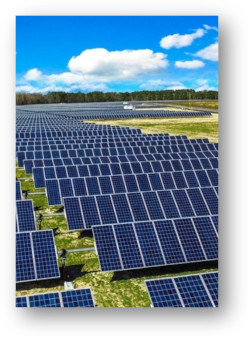DISCOUNT YOUR ELECTRICITY BILLS USING SOLAR ENERGY CREDITS
You can benefit from:
-
Zero-risk savings on your electric bill
-
Going green and supporting solar energy
-
No on-site panels required
-
Discounted Savings for 10-20 years
Community Shared Solar (CSS) projects allow you to earn net metering credits on your monthly electric bills, saving you money on energy, demand charges, and other aspects of your bill. Sometimes called ‘Solar Gardens’ in other states, CSS net metering credits are available to all types of meters and electric customers, including residential, commercial, industrial, government and non-profit groups. CSS is perfect for those wanting to go green who can’t install a solar for any reason, even if you don’t own your building. As ‘bottom line’ credits on your electric bill they may also be used in combination with Competitive Supply agreements to bring your electric costs down to a minimum. See our FAQs below for more about CSS credits.
Through our many sales partners AED offers CSS credits from many solar project locations. CSS regulations typically require that credits are obtained from solar projects within your local geographic area and utility ‘load zone’. We have credits available right now for projects in the following areas. Contact your Sales Representative to acquire CSS credits from these projects.
Table of Available CSS credits:

- Project Name
- Carver Solar
- {{content-2}}
- {{content-3}}
- State/Region
- Carver. Massachusetts
- {{content-2}}
- {{content-3}}
- Load Zone
- Eversource SEMA
- {{content-2}}
- {{content-3}}
- kW available
- 300
- {{content-2}}
- {{content-3}}
- Discount %
- 10
- {{content-2}}
- {{content-3}}
(BK Note: The noting of the load zone is nice, but people are going to need to know what load zone they fall into. Supply list? Map? There is no good clear map that I’ve seen.) Also, trying to make this work across multiple states and different discounts, so modified the words somewhat.
FAQs about Community Shared Solar
What exactly is ‘Community Shared Solar’?
Community Shared Solar (CSS) offers a way for businesses to take advantage of clean, green solar energy without installing solar on their property through the purchase of “Net Metering Credits”. Community ‘Solar Gardens’ (shared solar projects) are installed remotely and will export all of the electricity to the grid in exchange for bill credits from the local electric utility. These bill credits are converted to dollars based on the cost of energy at the location the garden is constructed. The dollar credits are what we are selling to you, at a discount. Essentially, we are selling you dollars for ninety cents.
How much will I save?
Your savings will depend on how many dollar bill credits you buy. Think of these bill credits are “Utility gift cards”. For example, if you buy $100 worth of bill credits (or “gift cards”) each month, you only pay us $90 for then (or whatever the discount is for that project) – and only after you receive the credit on your bill! That $100 gift card will be applied to the bottom-line amount on your electric bill — thus saving you 10% (in this example) on the amount of credits that you purchase.
What about my electric service?
Since the solar garden will not be located on your property, your existing electric service will not be impacted. You will always be connected to the grid to receive safe, reliable power. The “Utility gift cards” you receive from other sites are simply used to pay your electric bill.
Where is the energy coming from?
The energy from these Community Solar Gardens will be coming from local projects in your area. The energy is distributed to the local utility’s transmission lines, and as long as your electric bill is from that utility, you’ll be able to take advantage of the solar energy from that array!
What if I have a third-party electric supplier?
Community Shared Solar doesn’t run against competitive third-party electric supply — it actually compliments it! No matter who your third-party supplier is or what your rate is, you’re always going to have an electric bill at the end of the month. Net Metering Credits are applied to the bottom-line amount of whatever appears on your electric bill, so you’ll always save 10% on the amount of credit you’re buying.
What if my third-party electric supplier provides me with a separate bill?
Currently, most programs only allow the CSS credits to be applied against charges appearing on the local utility’s electric bill. So if your electricity supply is billed separately, only the items on the utility’s electric bill will be covered. With demand charges and transmission charges, there may still be a lot to apply the credits to. However, many times you can request that your third-party supplier ‘bill through’ the local utility to have the energy charges also appear on the utility’s bill. Then the CSS credits can be applied against everything on the bill, including the energy portion.
How many credits can I buy?
Depending on your state’s CSS regulations, you can purchase a maximum of 25kW-equivalent of credits from each project, or about $250 worth of credits per month. But, depending on your state, you can buy credits from multiple sites! In addition to the savings, you can proudly state that your business is helping to support local renewable energy.
